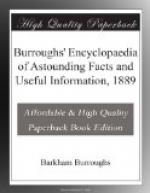AT THE GRAVE OF A CHILD.
Colonel Ingersoll upon one occasion was one of a little party of sympathizing friends who had gathered in a drizzling rain to assist the sorrowing friends of a young boy—a bright and stainless flower, cut off in the bloom of its beauty and virgin purity by the ruthless north winds from the Plutonian shades—in the last sad office of committing the poor clay to the bosom of its mother earth. Inspired by that true sympathy of the great heart of a great man, Colonel Ingersoll stepped to the side of the grave and spoke as follows:
“My friends, I know how vain it is to gild grief with words, and yet I wish to take from every grave its fear. Here in this world, where life and death are equal king, all should be brave enough to meet what all the dead have met. The future has been filled with fear, stained and polluted by the heartless past. From the wondrous tree of life the buds and blossoms fall with ripened fruit, and in the common bed of earth the patriarchs and babes sleep side by side. Why should we fear that which will come to all that is? We cannot tell; we do not know which is the greater blessing—life or death. We cannot say that death is not a good; we do not know whether the grave is the end of this life or the door of another, or whether the night here is not somewhere else a dawn. Neither can we tell which is the more fortunate, the child dying in its mother’s arms, before its lips have learned to form a word, or he who journeys all the length of life’s uneven road, taking the last slow steps painfully with staff and crutch. Every cradle asks us ‘whence,’ and every coffin ‘whither?’ The poor barbarian, weeping above his dead, can answer these questions as intelligently and satisfactorily as the robed priest of the most authentic creed. The tearful ignorance of the one is just as good as the learned and unmeaning words of the other. No man, standing where the horizon of life has touched a grave, has any right to prophesy a future filled with pain and tears. It may be that death gives all there is of worth to live. If those we press and strain against our hearts could never die, perhaps that love would wither from the earth. May be this common fate treads from out the paths between our hearts the weeds of selfishness and hate, and I had rather live and love where death is king, than have eternal life where love is not. Another life is naught, unless we know and love again the ones who love us here. They who stand with breaking hearts around this little grave need have no fear. The larger and the nobler faith in all that is and is to be, tells us that death, even at its worst, is only perfect rest. We know that through the common wants of life, the needs and duties of each hour, their grief will lessen day by day, until at last these graves will be to them a place of rest and peace, almost of joy. There is for them this consolation, the dead do not suffer. If they live again, their lives will surely be as good as ours. We have no fear; we are all the children of the same mother, and the same fate awaits us all. We, too, have our religion, and it is this: ‘Help for the living; hope for the dead.’”




